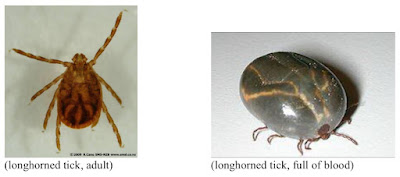
Female nymph and adult
In late 2017, animal health experts in New Jersey identified a Haemaphysalis longicornis tick, commonly known as the “longhorned tick” or “bush tick,” on a sheep in Hunterdon County. Recently, the tick has also been found in Union and Middlesex Counties.
As of April 13, 2023, longhorned ticks have been found in Arkansas, Connecticut, Delaware, Georgia, Indiana, Kentucky, Maryland, Massachusetts, Missouri, New Jersey, New York, nNorth Carolina, Ohio, Pennsylvania, Rhode Island, South Carolina, Tennessee, Virginia, and West Virginia.
The longhorned tick is not native to the United States. However, it is a serious threat to livestock in Australia, New Zealand and countries of eastern Asia.
Compared with well-known native ticks (such as the blacklegged tick, lone star tick and American dog tick), the Asian longhorned tick appears to be less attracted to human skin
The longhorned tick is not native to the United States. However, it is a serious threat to livestock in Australia, New Zealand and countries of eastern Asia.
Finding the longhorned tick in New Jersey in 2017 was noteworthy because it was the first time this tick was found in the United States. Animal health authorities are still investigating exactly how the longhorned tick entered the U.S. Some possible ways it may have entered include entering on domestic pets (e.g. dogs), horses, livestock or humans.
The reason this tick is a concern is because it may pose a risk to New Jersey livestock. It is a serious pest that can attach itself to various warm-blooded animals to feed. If too many ticks attach to one animal, the loss of blood can kill the animal. Ticks can also spread a variety of diseases.
The property where the tick was found and animals living there were treated to eliminate the tick. The state will continue to monitor wildlife, livestock and horses in the local area for these ticks.
If you find a suspected longhorn tick on you, your pets, horses, livestock or hunter-harvested deer, please collect the tick for animal health officials to identify. Place the tick in a snack or sandwich size Ziploc baggie along with a small stamp size piece of moistened tissue paper and seal it. Do NOT use tape to secure the tick.
Call the New Jersey Tick Line at: 1-833-NEW-TICK (833-639-8425)
Sources
https://www.nj.gov/agriculture/divisions/ah/pdf/TickInfosheet.pdf
https://www.cdc.gov/ticks/longhorned-tick/index.html

No comments:
Post a Comment